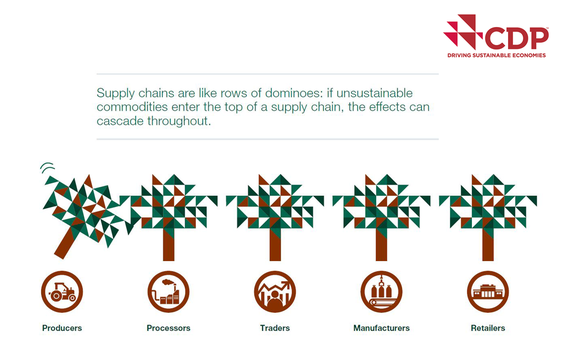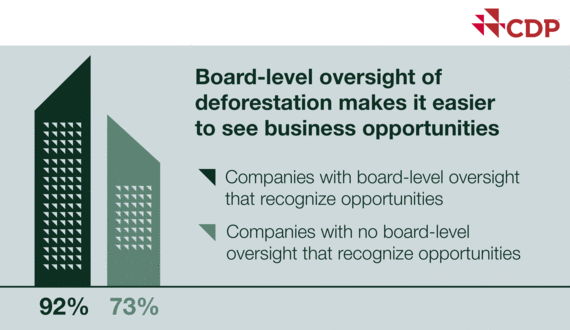For any company active in the global trade in timber products, soy, palm oil, or cattle products, deforestation is a critical business issue - whether they know it or not. The production of these forest-risk commodities can contribute to habitat loss, greenhouse gas emissions and social conflict - resulting in direct and supply chain exposures for traders and customers alike.
Companies too are slowly, but surely, moving to recognize deforestation-risk as a business priority. CDP's forests program asks companies on an annual basis to detail information about their efforts to understand, assess and manage deforestation-related business risks.
This year we had responses from over 200 companies, up from 180 in 2015, including Archer Daniels Midland, Bunge and Cargill (who make up three of the four so-called 'ABCD' global commodity trading giants), the three largest slaughterhouses in Brazil and big-name brands from Nestlé to Starbucks.
Our role at CDP is to hold up the mirror for the private sector so we can reflect back to the market data that will guide decision-making. To that end, we analyzed the wealth of data from this year's disclosures with one overarching question in mind: Will companies whose business activities continue to drive deforestation be commercially viable in future?
CDP's data suggests that no, companies can no longer afford to keep buying and selling products that continue to contribute to the destruction of the world's forests. Here are five reasons why:
1.Revenue is at risk
CDP's data shows that a substantial share of annual corporate turnover is dependent on commodities responsible for deforestation. Companies report that, on average nearly a quarter of company revenues (24%) depend upon the four agricultural commodities they reported on. We estimate that up to US$906 billion in annual turnover could be at risk for publicly listed companies. Companies rely on this income to drive future growth. However, by failing to address deforestation-risks within their supply chains, companies will be leaving a significant tranche of their revenue at risk from supply chain shocks.
2.Impacts can ripple through supply chains
Supply chains are like rows of dominoes: if unsustainable commodities enter the top of a supply chain, the effects can cascade throughout. As Associated British Foods Plc notes in its disclosure to CDP, "In the commodity world, segregated supply chains are physically challenging and become commercially challenging when the next supply chain player has a slow awareness of the issues at play."
Conversely, failures downstream in terms of weak procurement or lax standards can have ripple effects higher up the supply chain, by removing incentives for producers, processors and traders to ensure the sustainability of their operations or immediate suppliers. As Dunkin' Brands group Inc. says, "by requiring our palm oil suppliers to comply with our sustainable palm oil sourcing guidelines, we are helping influence the market and demand for sustainable palm oil."
3.Investors are putting companies under the spotlight
A growing number of investors want to know what companies are doing to address deforestation within the supply chain, in order to reduce risk in their portfolios. This year, 365 investors, over a fifth more than in 2015, with a total of US$22 trillion in assets asked companies to disclose this information via CDP.
Through shareholder resolutions, investors are also calling for reporting on deforestation management practices. In 2016, global commodity traders ADM and Bunge have disclosed through CDP's forests program after two were filed against them by the Investor Network on Climate Change a year ago.
Investors also continue to drop companies linked to deforestation. Earlier in March, Norway's Government Pension Fund Global, the world's largest sovereign wealth fund, divested from 11 companies over deforestation concerns .
And don't expect investor action to slow down: Our We Mean Business coalition partners Ceres have joined forces with the UN Principles for Responsible Investment to help mobilize institutional investor action on this critical financial challenge. This new investor group seeks to engage with food and timber companies in particular to ensure they are eliminating deforestation.
The Global Canopy Programme's new Forest 500 results also provide evidence that investor policies are moving to recognize deforestation risk. Nearly a quarter of financial institutions in its sample of forests 'powerbrokers' have policies that apply to one or more forest-risk commodities. Overall, the Forest 500 report concludes that strong policies from a small number of leading financial institutions are yet to be matched by their peers and client/investee companies. This is certainly one part of the wider challenge that must be addressed if the private sector is to get its act together in time to end deforestation.
4.The stigma around deforestation can impact brand value
Deforestation risk within commodity supply chains is real, and the lack of its management is influencing the perceptions customers have of global companies. Sourcing from suppliers breaching agreements to halt deforestation or having illegal material entering supply chains can damage brand value through knock-on reputational impacts, manifesting themselves as consumer boycotts, community opposition, and increased regulatory scrutiny.
For example, towards the end of 2013/beginning of 2014, a Greenpeace campaign was launched against Delhaize Group pressuring the company to commit to deforestation-free palm oil beyond sourcing RSPO certified material. This was picked up by a significant number of media channels, resulting in damage to the Group's brand value - according to their disclosure to CDP's forests program. Additionally, a number of companies including Colgate-Palmolive, Croda International and Golden Agri-Resources, cite a potential reduction in revenue as a result of company brand damage. Danone reports 'the unsustainable sourcing of timber could be associated with deforestation in some regions. This association can damage brand value and drive consumer purchasing decisions."
5.Companies who fail to embrace sustainability risk being left behind
In the last 18 months, two crucial international agreements have sketched out the framework for a global economy that is more environmentally and socially sustainable: The Sustainable Development Goals and the Paris Agreement. As a result, business has an increasingly crucial role to play in addressing the sustainability challenges the world faces to align with these initiatives.
Companies that do not take action, will not be able to seize on the opportunities that producing or sourcing sustainable commodities represents. Take for example manufacturers and retailers that do not work with their suppliers - they are able to recognize 59% less opportunities than those who do. Similarly, companies that do not have board level oversight are able to recognize 19% less opportunities than those who do.
The business case for action on deforestation is clearer than ever. Where will you stand - on the side of the leaders or the laggards?


